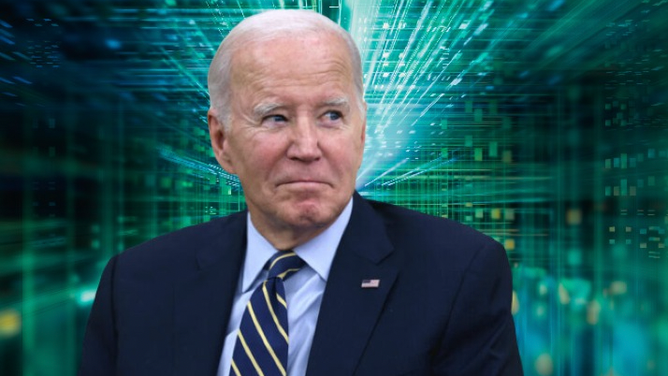Google Is Again Trying To Interfere In The Election To Help Joe Biden: Bobby Burack
The threat of Big Tech interference looms over the 2024 election.
In 2020, Facebook and Twitter, now called X, suppressed the New York Post's accurately reported exposé on Hunter Biden’s laptop.
Twitter barred users from sharing the link. Facebook applied a practice it calls “decreased distribution,” in which it places a story so low into newsfeeds that only accounts continuing to scroll can find the link.
Meta CEO Mark Zuckerberg says Facebook buried the Hunter Biden story at the behest of the FBI, which baselessly warned the service of incoming “Russian propaganda” weeks before the New York Post report.
"Basically the background here is the FBI, I think basically came to us — some folks on our team and was like, ‘Hey, um, just so you know, like, you should be on high alert. There was the — we thought that there was a lot of Russian propaganda in the 2016 election. We have it on notice that basically there’s about to be some kind of dump of — that’s similar to that. So just be vigilant," said Zuckerberg in 2022 on why Facebook buried the Post report.
Over 16% of Biden voters say they would have voted differently in 2020 had they been aware of the laptop report.
Big Tech assisted Joe Biden in his bid for the White House three years ago. And is already assisting in his bid to stay there.
There is one tech platform more influential than Facebook. It's called Google.
As of August 2023, Google accounted for 91.9% of search queries conducted across search engine providers. The competing search engines -- Bing, DuckDuckGo, Yahoo -- are essentially non-factors.
With such market dominance, Google controls what users see and what they know.
Thus, Google's influence over American politics is significant.
This week, MRC Free Speech America uncovered how Google manipulates the search results of presidential candidates.
The group searched “Republican presidential campaign websites” on the eve of Wednesday night’s Republican primary debate. Yet only two candidates appeared on Google, including Will Hurd, a never-Trumper from Texas, who didn't have enough support to appear during the second debate.
"There was no sign of Donald Trump, Ron DeSantis, Nikki Haley, Vivek Ramaswamy, Mike Pence, Tim Scott or Chris Christie," writes Miranda Devine.
"But there was one other candidate who showed up on Page 1 of the Republican search results: fringe Democrat Marianne Williamson, whose RealClearPolitics average doesn’t even reach 5%. Maybe that’s Google’s idea of 'balance.'"

Understand that only 1% of users ever click past the first page of search results. Links, like Trump's website, that register past the first page are essentially non-existent.
Luckily for Joe Biden, he did appear on the first page when the MRC searched for “Democrat presidential campaign websites.”
Of course, Biden should appear on the first page. He's the president of the United States. Though why should Robert F. Kennedy Jr., whom polls say is Biden's most serious Democratic challenger, be related to the second page?
We can't say for certain. There is no one to ask.
Who runs Google? Who makes those decisions?
Well, that's just part of the mystery. No one knows. There is no transparency in Google's rulings, or front-face figure to hold accountable.
The faceless, and likely compromised, make the decisions.
And those anonymous Google executives can dictate the visibility and lack thereof of any news story they choose.
Perhaps that explains why stories covering damning testimony from Devon Archer, Hunter's former business associate, at the House Oversight Committee last month often ranked on the second and third pages of Google when searching "Hunter Biden."
Google also influences users with its signature daily reminders and event calendars. However, not every user is subject to the same notifications.
Google takes it upon itself to decide who should and should not be aware of specific dates, based on their search history.
Like final days to register for voting.
Dr. Robert Epstein, a research psychologist, documented what he described as Google's “strong bias in favor of Democrats" during the weeks and months before the 2020 election:
“We found a period of days where the vote reminder on Google’s homepage was being sent only to liberals,” Epstein explained in 2021 upon the conclusion of his field study. “Not one of our conservative field agents received the vote reminder.”
“The bias was being shown to pretty much every demographic,” added Epstein. “This includes conservatives.”
“Conservatives got more liberal bias in their search results than liberals.”
Epstein calculates that the impact of the bias was substantial. He says Google's quantified manipulations shifted at least six million votes in favor of Joe Biden.
“That’s the bare minimum,” Epstein claims.
Services like Facebook acted as if they were not private companies, but agents of the government. That's a First Amendment concern.
And the FBI's role in the 2020 election should be investigated heavily.
Unlike RussiaGate, those are not conspiracies.
Big Tech social media services meddled in the 2020 election. That's obvious. And they will do so again. It appears they've already begun.
Beating Joe Biden in 2024 is one thing. Defeating Big Tech is another.